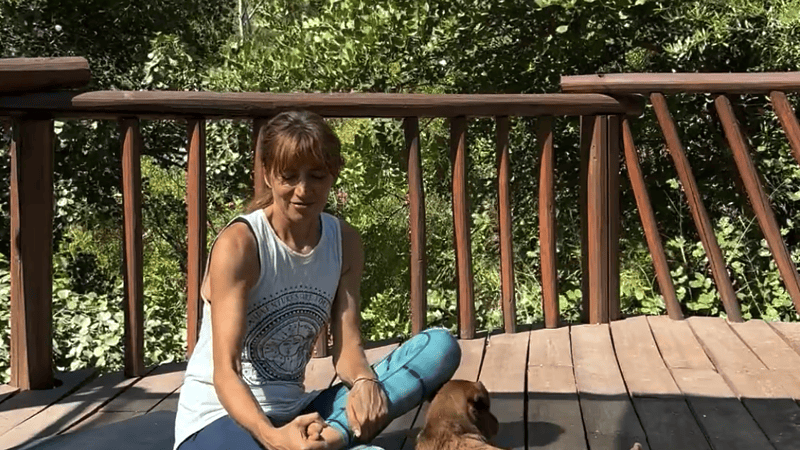
Yoga for Chronic Stress
How Yoga Rewires the Brain and Relieves Chronic Stress - By Cerian Smith
Reading time: 3 minutes
At the point I stopped working as a classroom teacher, I was in a state of overwhelm. I couldn’t sleep properly, I couldn’t focus, I couldn’t find the words I needed, and eventually I couldn’t stop crying. My nervous system had become stuck in a state of threat response and finding relief was impossible.
The sympathetic nervous system has a healthy place in activity- it gets us up in the morning, it's aroused when we are busy and productive, or when we're exercising, for example. It's also part of the response to threat, which in our distant past might have been something we needed to physically fight or run away from but which nowadays is more often something like a bill we can't pay, a commute that makes us late, or competing demands that we don't have the resources to complete but which we're still responsible for.
We often can't alleviate the stressful situation- meaning we get stuck in this sympathetic nervous system arousal, and literally can't switch off from our stress.
Biologically, the amount of cortisol and other stimulating neurotransmitters that my brain was producing in its stressed state had reduced the activity levels and blood flow to the parts of the brain which deal with rationality and problem solving.
It's these parts- the prefrontal cortex, the hippocampus, and other areas in the cortex- which are involved in executive function, working memory, and other higher-level functions; and which can help to reduce the stress response, so when they are degraded like this a vicious circle is set up.
The loss of ability in the cortex can in itself increase stress, anxiety, and depression- we lose the ability to sleep, to store memories, to express ourselves, to take decisions, to think rationally and solve problems, we might even lose our words- and a host of other effects which can be very distressing and can lead to difficulties in social or professional settings, further increasing stress. This number of negative feedback loops happening at once and each acting on the others can make the cycle very difficult to overcome.
When I was signed off work, I was in despair. I had enjoyed my job, I had support from my mother, I had friends and a wonderful daughter. I spent the days after being signed off walking the dog for miles around the beautiful area where we live, in the woods and beside the canal and the river- out in nature, with my dog, moving and exercising.
I had no work to do other than looking after my daughter and home. I was doing lots of the things we're told to do when we're stressed, or anxious or depressed. Why didn't I feel better?
It wasn't until I started practising yoga several times a week that I did start to feel better. Yoga provided something that other forms of exercise weren't giving me. The endorphins that made me feel good after a run or a walk didn't last very long before I sank back into the pit of despair, whereas the lift I got from a yoga class carried me right through the day. Why?
Yoga* is unusual in that it combines a number of different things which have positive effects on our brain and its chemistry. It can offer exercise, challenge, concentration, and also control of the breath. Our breath is the only part of the autonomic nervous system that we can control consciously, and yoga practices use that a lot.
If you've been to a vinyasa flow class or an Ashtanga practice, you may well have experienced the teacher saying something like, "Inhale reach up, exhale to fold" or "Inhale to upward facing dog, exhale back to downward facing dog".
What does this do? For one thing, it forces us to concentrate on breathing, so we have a focus for the mind; for another, it forces us to extend the exhale and slow the breath down far more than we might naturally do during exertion.
If your yoga class also offers you specific breath practices, then it's asking you to concentrate on the process of breathing, and to exert control over the breath, and sometimes, to extend your exhale. Extending the exhale can activate the parasympathetic nervous system- the ‘rest and digest’ mode: just think about how you might sigh with relief, or in impatience to control temper- and doing this changes the way your brain is behaving, it changes the neurotransmitters that are being released from the stress hormones to more soothing ones.
At the same time, the exercise part of a yoga practice can increase the 'happy hormones' serotonin and dopamine, making us feel good, and learning new movements also stimulates blood flow to the parts of the brain which control planning and movement- the very parts which suffer from reduced blood flow during a threat response.
Thirdly, yoga practitioners often access a meditative state, and meditation has been shown to provoke this ‘relaxation response’ in the body.
With practice, the body can become accustomed to switching in a healthy way between the sympathetic and parasympathetic nervous systems, rather than getting stuck in sympathetic activation; this sets up a virtuous circle to replace the negative feedback loops which cause the mental and physical health problems associated with chronic stress.
Other activities then become possible- creativity, play, concentrating on a book, or enjoying the company of friends- the things that we can't seem to focus on or enjoy when we're stressed, but which can offer the rest and relaxation that we all need, and without which our lives are poorer.
As a set of practices, yoga can offer something more than other forms of recreation because of the specific attributes that it almost uniquely brings together. If you, or someone you know, is suffering with the effects of stress, maybe it’s worth giving yoga a go?
*commission earned from this link.







